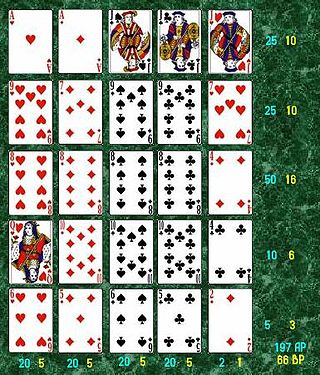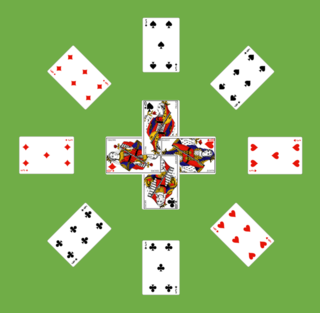
Klondike, also known as Canfield, is a card game for one player and the best known and most popular version of the patience or solitaire family, something which "defies explanation" as it has one of the lowest rates of success of any such game. Partly because of that, it has spawned numerous variants including Batsford, Easthaven, King Albert, Thumb and Pouch, Somerset or Usk and Whitehead, as well as the American variants of the games, Agnes and Westcliff. The distinguishing feature of all variants is a triangular layout of the tableau, building in ascending sequence and packing in descending order.

Yukon is a type of patience or solitaire card game using a single deck of playing cards like Klondike, but there is no deck or stock, and manipulation of the tableau works differently.

Spider is a type of patience game, and is one of the more popular two-deck solitaire games. The game originates in 1949, and its name comes from a spider's eight legs, referencing the eight foundation piles that must be filled to win the game.

Pyramid is a patience or solitaire game of the Simple Addition family, where the object is to get all the cards from the pyramid to the foundation.
Accordion is a patience or card solitaire using a single deck of playing cards. It is so named because it looks like accordion pleats, which have to be ironed out. The object is to compress the entire deck into one pile like an accordion.

Napoleon at St Helena is a 2-deck patience or solitaire card game for one player. It is quite difficult to win, and luck-of-the-draw is a significant factor. The Emperor Napoleon often played patience during his final exile to the island of St Helena, and this is said to be the version he probably played. Along with its variants, it is one of the most popular two-deck patiences or solitaires. The winning chances have been estimated as 1 in 10 games, with success typically dependent on the player's ability to clear one or more columns. The game is the progenitor of a large family of similar games, mostly with variations designed to make it easier to get out.

Poker Squares is a patience game with the objective of building the best poker hands using just 25 cards from the deck. It rewards both lucky guessing and accurate calculation of odds.

Quadrille is the name of two loosely related card games of the Patience or solitaire type which are often confused. Both use a pack of 52 playing cards. The earlier one was also known as La Française or Royal Quadrille, the slightly later one as Captive Queens. The name is derived from the desired outcome of the earlier game in which the four Kings and Queens are arranged in a square formation as in the European dance of quadrille that was fashionable in the 18th and 19th centuries.
Hit or Miss is a patience or card solitaire that uses a deck of 52 playing cards. It is an unusual one in that the player deals the cards one at a time. The game is significantly based on luck-of-the-draw, but the process of elimination gives it appeal nonetheless.
Fourteen Out is a Patience card game played with a deck of 52 playing cards. As this game involves carrying off cards with a fixed sum, it belongs to the same family of games as Pyramid. The name refers to the goal of each turn to make pairs that add up to 14.

Baroness is a patience or card solitaire that is played with a single deck of 52 playing cards. It is similar to other members of the Simple Addition family and is also distantly related to Aces Up.
Westcliff is the name of two closely-related patience or card solitaire games of the simple packer type, both of which are played using a deck of 52 playing cards. One version is particularly easy to win, with odds of 9 in 10; the other is harder with odds closer to 1 in 4. The game has a variant, Easthaven.

Alhambra is a solitaire card game which is played using two decks of playing cards. Its unusual feature is akin to that of Crazy Quilt: the cards in the reserve are built either on the foundations or on a waste pile.
Napoleon's Square is a patience or solitaire card game which uses two decks of playing cards. First described in a revised edition of Lady Cadogan's Illustrated Games of Patience or Solitaire in the early 1900s, it is an easy variation of Napoleon at St Helena. It is not determined if Napoleon actually played this game, or any solitaire game named after him.
Deuces or Twos is a patience or card solitaire game of English origin which is played with two packs of playing cards. It is so called because each foundation starts with a Deuce, or Two. It belongs to a family of card games that includes Busy Aces, which is derived in turn from Napoleon at St Helena.
Amazons is an old patience or card solitaire game which is played with a single deck of playing cards. The game is played with a Piquet pack minus the kings or a standard 52-card pack that has its twos, threes, fours, fives, sixes, and kings removed. This game is named after the female-led tribe, the Amazons, because the queen is the highest card, and all queens are displayed if the game is won.

Fortune's Favor or Fortune's Favour is a patience or card solitaire which is played with a deck of 52 playing cards. It is so-called probably because the chances of winning are completely on the player's side. It is a significantly simplified version of the game Busy Aces, a member of the Forty Thieves family of solitaire games.
Royal Flush is a solitaire card game which is played with a deck of 52 playing cards. The game is so called because the aim of the game is to end up with a royal flush of any suit.

Patience (Europe), card solitaire or solitaire (US/Canada), is a genre of card games whose common feature is that the aim is to arrange the cards in some systematic order or, in a few cases, to pair them off in order to discard them. Most are intended for play by a single player, but there are also "excellent games of patience for two or more players".
Good Thirteen is a simple, German patience game for one person, played using a French pack of 52 playing cards. It also goes under the name Thirteens.























